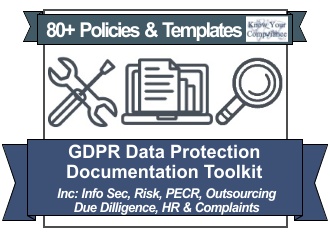-
×
 GDPR Document Toolkit
1 × £399.00
GDPR Document Toolkit
1 × £399.00
Subtotal: £399.00
![]() Most firms will have an Outsourcing Policy Template that is used to document their objectives and procedures for outsourced services and functions. The term ‘outsourcing’ refers to any business function or service that is provided by, or contracted out to an external provider or supplier.
Most firms will have an Outsourcing Policy Template that is used to document their objectives and procedures for outsourced services and functions. The term ‘outsourcing’ refers to any business function or service that is provided by, or contracted out to an external provider or supplier.
Common examples of functions that are outsourced or are provided by an external supplier include postal and mailing services; shredding and confidential waste disposal; IT services and disaster recovery; debt collection and translations.
Not all businesses will outsource functions or services. However many SME’s use external providers to reduce their own resource need. Outsourcing usually happens for 3 reasons: –
Business Process Outsourcing (BPO) is the specific outsourcing of business processes (as opposed to assets or people) and has become a common part of most businesses in today’s market. There are 2 main definitions of BPO: –
Where a regulated firm outsources any of its business functions, it has a duty to its employees, customers and regulators to ensure that the function is still being completed compliantly, ethically and satisfactorily.
It is ultimately the firm’s responsibility to ensure compliance, even when the function or process is being completed elsewhere. For this reason, a strict and robust outsourcing policy and procedures are necessary.